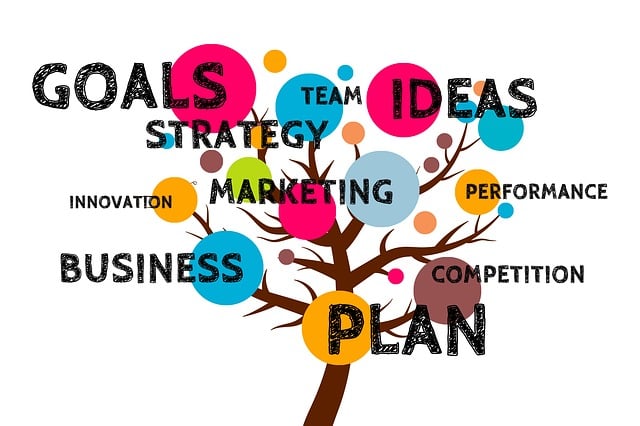Event planning for local businesses requires a strategic approach that combines creativity with a deep understanding of the local market, including regional preferences and logistical challenges. A data-driven strategy aligned with current trends is essential to create engaging experiences that resonate with the target audience and enhance brand identity. Detailed planning from conceptualization to execution, clear goal setting, and timeline management are key. Stakeholder communication, adaptability to change, and the use of project management tools ensure successful event rollout. This guide on Event Planning for Local Businesses provides a comprehensive blueprint for leveraging events as effective tools for increasing brand visibility and fostering customer engagement, emphasizing the importance of local collaboration for authenticity and community support. By integrating local resources and focusing on personalization, small enterprises can host memorable corporate events that are not only impactful but also contribute to a positive brand image.
Navigating the dynamic landscape of corporate events, local businesses stand to benefit immensely from expert coordination. This article delves into mastering the art of event planning tailored specifically for these enterprises. Through a series of meticulously crafted sections—ranging from strategic insights to leveraging local resources and talent—businesses will glean the tools necessary for orchestrating engaging, memorable events that resonate with their audience. Whether enhancing team dynamics or showcasing your brand’s strengths, the guidance provided here will elevate any corporate gathering to a new level of excellence.
- Mastering the Art of Event Planning for Local Businesses: A Guide to Flawless Execution
- Key Strategies for Engaging and Memorable Corporate Events: Insights for Local Business Planners
- Leveraging Local Resources and Talent: Creativity in Corporate Event Planning for Small Enterprises
Mastering the Art of Event Planning for Local Businesses: A Guide to Flawless Execution

Crafting a successful corporate event for local businesses requires a blend of creativity, attention to detail, and strategic planning. Event planners must navigate the unique challenges presented by regional markets, including understanding local preferences, vendor relationships, and logistical considerations. A meticulous approach is essential, ensuring that every aspect of the event, from venue selection to guest experience, aligns with the company’s objectives and brand identity. By leveraging local resources effectively, planners can create a memorable occasion that not only meets but exceeds expectations. Utilizing data-driven strategies and staying abreast of trends specific to the local business landscape allows for events that are not just well-executed but also resonate with the target audience, fostering engagement and building lasting relationships.
To achieve flawless execution, event planners must adhere to a structured planning process. This includes setting clear goals, defining the target audience, and creating a detailed timeline that accounts for all pre-event, during-event, and post-event activities. Effective communication with stakeholders is key, as is maintaining flexibility to adapt to unforeseen circumstances. By employing robust project management tools and techniques, planners can monitor progress, manage budgets, and coordinate with vendors and suppliers to deliver an event that showcases the local business in the best possible light. The guide to mastering the art of event planning for local businesses is a comprehensive resource, offering insights into the logistical, operational, and creative aspects required for flawless execution. It empowers planners to harness the full potential of corporate events as a tool for brand amplification and customer engagement.
Key Strategies for Engaging and Memorable Corporate Events: Insights for Local Business Planners

Crafting engaging and memorable corporate events requires meticulous planning and a deep understanding of your audience. For local business planners, event planning is not just about organizing activities; it’s about creating experiences that resonate with attendees and reflect the brand’s values. A successful corporate event should seamlessly blend professional objectives with entertaining elements to captivate participants throughout the duration of the event.
To achieve this, local businesses must strategize effectively. Begin by defining clear goals for the event—whether it’s to launch a new product, celebrate a milestone, or foster team building. The selection of an appropriate venue that aligns with your company’s image is crucial. Ensure that the space not only accommodates the planned activities but also allows for flexibility if certain elements need to be adjusted on the fly. Engage professionals like caterers and entertainment providers who understand the local context and can contribute to the event’s success. Utilize technology, such as event management software, to streamline processes like registration, scheduling, and communication with attendees. Lastly, incorporate interactive elements like live polls, Q&A sessions, or breakout groups to encourage active participation and make the event a dynamic platform for learning and networking. By focusing on these strategies, local business planners can create corporate events that are not only engaging but also leave a lasting impression.
Leveraging Local Resources and Talent: Creativity in Corporate Event Planning for Small Enterprises

When small enterprises aim to host memorable corporate events, leveraging local resources and talent becomes a cornerstone of successful event planning for local businesses. By tapping into the rich pool of suppliers, service providers, and creative professionals within their vicinity, these businesses can create unique and impactful experiences that resonate with attendees. The use of locally-sourced materials not only supports the community but also adds an authentic touch to the event, often leading to more personalized and bespoke outcomes. For instance, local caterers can offer regional cuisine that impresses guests with its flavors and cultural significance. Moreover, engaging local musicians or entertainers can infuse the event with a sense of place and occasion, ensuring that the experience is both relevant and captivating.
In addition to utilizing local resources, small enterprises can foster creativity by thinking outside the conventional event templates. This approach allows for innovation in themes, activities, and logistical execution. By collaborating with local artists, designers, and technicians, businesses can bring to life creative concepts that are both cost-effective and visually striking. The involvement of local talent not only enhances the aesthetic appeal but also contributes to a sense of community and shared investment in the event’s success. This strategy is particularly advantageous for small enterprises looking to make a lasting impression without stretching their budget or resources, ultimately solidifying their brand identity through well-executed corporate events that highlight their commitment to local engagement and innovation.
In wrapping up, mastery in event planning for local businesses is not just an art but a strategic endeavor that can significantly enhance brand visibility and employee morale. By implementing the key strategies outlined in this article, from leveraging local resources to crafting engaging and memorable corporate events, businesses are poised to elevate their event execution to new heights. The insights provided here serve as a roadmap for small enterprises to create impactful experiences that resonate with their target audience while showcasing the unique flair of their locale. Embracing these principles will not only set a new standard for corporate events but also foster a stronger community connection and demonstrate an entrepreneurial spirit that is both innovative and resourceful.
